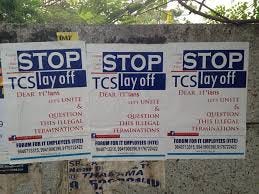TCS Layoffs & Resignations Cross 30,000 & Ratan Tata Is Sorely Missed
The IT giant had announced cuts of 2% to its workforce, translating to 12,000 jobs in July; but the number is more than double so far and layoffs continue
No. 12,000 employees were not laid off, as TCS announced in July. The number so far is more than double - over 30,000 at last count. And managers at Tata Consultancy Services or TCS, are under pressure to add more people to the layoffs count. This has sparked fears that layoffs could be as high as one lakh employees in the next year.
For the few who may not be aware, TCS is India’s largest IT services firm. Employing over six lakh (607,979) techies all over the world, it boasts of presence in six continents and 55 countries, raking in revenue of US $30 billion at the end of fiscal year 2025.
When contacted, TCS provided an email response to this journalist — “These speculations are incorrect and misleading. As communicated earlier, the impact is limited to 2% of our workforce."
But all is not well at the tech giant. Since October 2024, when its much beloved leader Ratan Tata breathed his last, the company has been in a state of upheaval. And its problems began before Covid-19 hit - with ill-thought out decisions by the leadership.
The late Ratan Tata; Image courtesy: Tata Group
The Tata Culture
As employees in their 40s and 50s are being summarily dismissed, the question arises as to why is a Tata Group company behaving in such a fashion.
The Tata culture is legendary. This term is wistfully referred to by every employee of TCS who has worked there during the Ratan Tata days. To them it meant job security, work-life balance and peace of mind.
TCS may not exactly be the best paymaster among India’s famed IT giants - increments were often a mere 6% for even the star performers. But this Tata culture created an army of loyal staff who almost literally “grew up” in TCS. It was a people-centric approach, with Ratan Tata refusing to fire employees and focussing instead on their wellbeing.
The elderly Tata famously said - “Leadership is not about being in charge. It is about taking care of those in your charge.” And he walked the talk.
But now, “we miss Ratan Tata,” is a constant refrain among TCS employees. “It appears as though they were just waiting for him to die,” is another one.
Employees who spoke with this journalist requested that their names and identities remain anonymous. They fear repercussions at the workplace.
IT employee unions paste protest posters; Source: Third Party
TCS HR Setting Employees Up To Fail?
The stories recounted of the seemingly indiscriminate firing are frightening. A policy has been put in place since June this year - employees say the policy was not framed in one go, but was conveyed to them verbally in bits and pieces.
Every employee must have 255 days of billing
This means a maximum of 35 days on the bench
While on the bench, 9 hours of work from office & 4 hours of iEvolve training (upskilling) is mandatory
The policy itself sounds reasonable in theory.
But the reality appears to be stacked against employees.
The Fluidity List
Many employees allege that they have been put on a Fluidity List. This list comprises those earning over Rs 18 lakh per annum who have been ranked C in the previous two review cycles.
The list is also supposed to comprise employees who have not upgraded their skill sets and who are deemed costly to the company. Other parameters taken into account are the number of days they worked from office and whether they have a project in hand or not.
Department heads are expected to provide these names to the HR who then add names to the Fluidity List.
“It is more akin to an execution list, as there is no scope offered for improvement,” said Employee A to this journalist.
The powerlessness of employees is evident when one considers the facts.
I) Billing employees
There are 3 sales roles in TCS: Business Development Team, which focusses on increasing revenue in the same account; the Sales Team that brings in new accounts or new projects within existing accounts; and the elite Major Markets Unit which goes after the large deals from $100 million to $1 billion.
There are mainly two types of projects taken up by TCS - T&M projects or Time & Material projects; and Fixed Bid projects. Fixed Bid projects are relatively fewer in number. T&M projects are those where the client specifies roles & seniority of employees to be attached to a particular project. Fixed Bid projects are staffed at the discretion of TCS with a goal given by the client.
In each project, 20% of the staff is located in the country where the deal is from. This is known as onsite. 80% of the project team is located In India, and called offshore.
All employees who are attached to a specific project or a client are termed billable. Roles which are not termed billable are Sales, Admin, HR, Senior Management and Research roles, among others. This caveat of having to be billable, in itself, sets most mid-level managers up for failure, for no fault of theirs.
II) The Bench
The Resource Management Group or RMG manages the benched employees. In essence, an employee who is not actively on a specific project is moved to the bench. HR then matches his/her skill sets with projects requiring support and maps them to projects.
Employees say that HR has considerably slowed down the process of mapping benched employees to projects. This, they say, offers the HR a window of opportunity to claim that the employee has overshot his/her 35 days on bench.
(III) C Grade In Two Consecutive Reviews
The grading of employees in TCS is of A, B, C and D categories. A is akin to Consistently Exceeded Expectations. B has Exceeded Expectations. C has Met Expectations and D was Below Expectations.
The norm is TCS has been that only around 10% of employees get the A grade. B is given to around 20% of employees. The vast majority of the employees would get a C grade - which in itself is not considered a bad ranking. C is given for techies who are good at their jobs. Only those with poor attitude and knowledge make it to D.
By setting the most commonly given C grade as the benchmark for being put on the fast-track to dismissal, the company has clearly shown who it wants to target and why.
Employees Lament
“They have ambulances and security personnel in almost all premises and layoffs are happening on a daily basis,” said Employee B to this journalist. “No electronic gadgets or phones are allowed during the exit meeting. Severance of only 3 months pay is given. The counselling and arrangements for future prospects for the retrenchment employees is a farce,” said B.
“Most of the middle management are given urgent assessments and are deliberately failed, to secure proof of poor performance. The other excuse is AI literacy. They say you don't have the required skills,” said B.
“For non-tech staff they give tech assignments and ensure they fail. They give multiple AI pro courses and ask them to clear it with a warning that failure could result in cessation of employment,” B added.
As for severance pay, it is a mixed bag - some have got fat exit packages, while others are forced to leave without any pay.
One veteran in TCS was asked to leave two days before his daughter’s wedding. At least two others who were instrumental in shaping TCS and mentored thousands, have simply been asked to go. One veteran who had 3 years to retire was given severance pay for 2 years and relieved.
There have been protests by a small unregistered IT union. But the majority of IT employees being laid off or forced to resign do not protest. They do not want their future prospects to be hurt in any way.
Many others have been put on Performance Improvement Plans or PIPs and asked to upskill themselves. “They are putting many experienced personnel in PIPs for no reason and giving them tough assignments and deliberately marking them as having failed so that they can send them off. I have been put in a PIP and they have given me 10 courses with 10 modules each and they are threatening that there would be 3 assessments where I should get more than 85% to stay in the company,” said Employee B.
Labour Laws In India
The Second Schedule of the Industrial Relations Code 2020 lays out the grounds for what are deemed as unfair labour practices.
Section 5 (f) of the Schedule states that those who are retrenched “in utter disregard of the principles of natural justice in the conduct of domestic enquiry or with undue haste” are victims of unfair labour practices.
A large number of TCS employees would certainly fall within this protection proffered by the law.
TCS employees ask why they have not been given the option of VRS or Voluntary Retirement Scheme. “Many would have quietly opted for it and moved out,” said Employee C. “When they could offer it to Air India employees, why not to us?”
*This article was updated on September 18 at 12:29 pm to include the email response from TCS.
Part 2 of this two-part series on TCS will delve into the mismanagement within the company and why layoffs are taking place only in TCS while other stressed or failed Tata Group companies haven’t witnessed any.




Very simple.
Chandrasekaran is more keen on protecting, persevering and pushing up his 155 crore pay package.
He is not a TATA, and can never be one.
Sorry if I sound arrogant, he is just another entitled Tambrahm.
Neither Ratan nor JRD ever had much personal wealth, relative to their position or stature, and they cared for people.
Firing was the last resort and usually only on disciplinary or integrity issues.
Nicely articulated